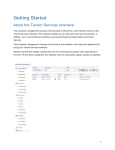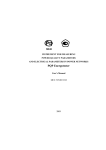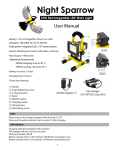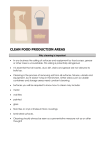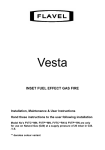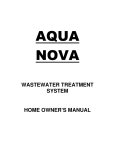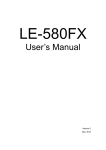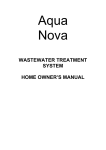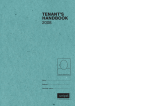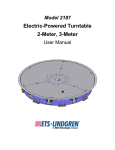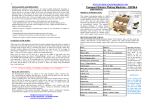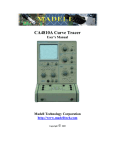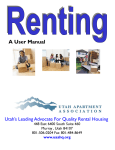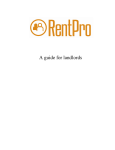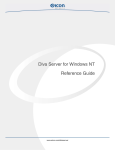Download Tenants Managed Handbook
Transcript
Tenants Managed by Munrolock HANDBOOK This guide is intended to give you an idea of how the management service works with Munrolock. Please keep it safe and refer to it whenever needed. We are here to look after the Landlords interests, but at the same time ensuring that the Landlord provides a comfortable place for you to live and follows all obligations and regulations. [email protected] REPORTING MAINTENANCE Follow these steps Please do not ring the Munrolock offices. There will not be anyone able to help you and you will be told to follow one of the two steps below. The staff in the offices do not take messages relating to maintenance or accounts or inspections, you must use the steps below. EMAIL TELEPHONE [email protected] 020 8123 9904 or [email protected] You will need to leave a message on this line. The call will be dealt with after a message is left. This should be the first thing you do. What happens when you report issues? Emergency Repairs EMERGENCY REPAIRS 24 HOURS An emergency repair is a repair that if not dealt with quickly, could affect the health, safety or security, of either yourself or any other persons using the building. These include: A blocked toilet or broken WC pan , Broken door or window which makes your home unsafe , A burst pipe , Electricity failure , Loss of water supply. Complete failure of heating or loss of hot water in winter only, where there are small children or blocked drain/soil stack. Urgent Repairs URGENT REPAIRS 5 DAYS This is a repair that causes a loss of an essential facility or a major inconvenience, and if left unattended could cause further inconvenience, damage or harm to other people. For example:Leaking roof, Overflow from toilet cistern, Cracked bath or wash basin, loss of heating or hot water to non vulnerable tenants and during the summer, Leaking waste pipe. Routine repairs ROUTINE REPAIRS A repair that can be left for a while, without causing too much disruption or inconvenience. For example: 20 DAYS Blocked or broken gutters or drainpipes, Minor roof repairs, Glazing or plaster repairs, Repairs to kitchen fittings MAINTENANCE STEPS 1. Report the issue as stated on the previous page. 2. Munrolock will contact you if we need further information. 3. You will be informed if a contractor will be contacting you or if we will be booking the contractor. 4. Normally you will be offered two different times for the contractor to visit. 5. If these times and dates are not suitable, it will become your responsibility to book the contractor. You will be given the contractors phone number and you will need to chase until you agree a date and time. 6. Once the contractor has visited, either with our management keys or whilst you are in, they will let us know if the job is complete or needs further visits. 7. Jobs that require estimates will take longer and more than one contractor may need to visit. For repairs that are likely to cost more than £250, it is likely that estimates will need to be obtained. This means some repairs can take longer than anticipated. In respect to emergency repairs, the contractor may not contact you to arrange a convenient time, but instead will use our management keys to enter the property. In respect to urgent and routine repairs, the contractor may try to contact you. If you do not respond, the contractor will arrange to use our management keys to enter the property. It is your responsibility to ensure we can access the property when needed for repairs. Maintenance in General. We understand that it can be inconvenient to have issues and be waiting to hear back from us with updates, however it is part of living in any property that there will be problems. Please be patient, as long as you have sent an email to [email protected], we will have received the issue and will attempt to deal with it within the timescales on this page. Contractor Visits The majority of the contractors we have are well known to us and are trusted companies. As per the Tenancy Agreement, you have signed to agree to contractor visits when necessary. If you would prefer to be present when they visit, then please ensure you liaise with the contractor to do this. Appointments Please remember as stated in the tenancy agreement, if an appointment is made for you to be at the property and you are not there, you will be charged for missing the appointment. User Manual 3 TENANTS ISSUES The first thing to remember and to always take into account, is that the contract and agreement for the property is between the Tenants and the Landlords. Munrolock do not have any responsibility for the condition of the property or the tenancy. The Landlord employs us on their behalf to deal with any issues, but anything we do regarding the property, is only on agreement from the Landlord. There are certain obligations that Landlords have regarding maintenance and repairs and this guide should help you understand more about this. At Munrolock, we will help make the decision if the issue is something the landlord or tenant is responsible for. Tenants will be charged if it is something they have done or could have repaired themselves. Appliances such as washing machines, freezers etc are not part of the landlords repair obligations after the first three months. No heating or hot water is not an emergency unless children live at the property. (Normally an engineer will be at the property within 24 hours, though it can take up to 5 days). Once a maintenance issue is reported, it will be looked at within 24 hours, 5 days or 20 days and Munrolock will make the decision based on Landlord obligations. Tenants Responsibility Over half the jobs that are requested are not the responsibility of the landlord or agent to correct. If there is any job that is deemed to be the responsibility of the tenant, then the tenant will be charged for the contractors invoice. Repairs and Maintenance can take some time to rectify. Anyone who has owned their own property will know that it is very often not a case of calling someone out and the job being done there and then. It can occasionally take several weeks to pinpoint what an issue is, then quotes can take a while before a job is taken on. User Manual 4 TENANTS RESPONSIBILITIES You are responsible for: • Internal decoration Minor repairs • Maintenance of appliances and fittings installed by you that do not belong to the Landlord This includes: • Painting and decorating the inside of your home • Altering doors for carpets • Replacing lost or damaged keys (We will charge you for the actual cost of replacing keys) • Repairing small plaster cracks • Replacing electric plugs, fuses & light bulbs • The upkeep of your own garden • Plumbing in your own washing machine • Replacing the toilet seat • Bath and sink plugs. Appliances in the kitchen are very often the tenants responsibility to repair, as very often the very reason they need repairing is down to the use by the tenants. For example, if a washing machine is not draining properly, it is likely to be caused by something blocking the pipes. The tenant may be required to pay for the call out for this. Loose hinges, fuses, cupboard doors coming off, shelves being loose, limescale around a shower/ bath, curtain poles coming loose etc are all usually the responsibility of the tenant to repair. User Manual 5 TENANTS DUTY The landlord has a certain amount of time to fix problems and it is not generally expected that the issue will be fixed the same day it is reported, unless it is an emergency. You should not organise any repairs yourself if you believe it is the responsibility of the landlord, as there will be no guarantee the landlord will refund any money you spend. Also you should not withhold rent if you believe a repair needs doing, as you are then in breach of your agreement and contrary to belief, tenants do not have an automatic right to do this. Heating, Hot water and Boilers. This is the item we are contacted about more than any other. 80% of the time, the tenant could have fixed the issue themselves. Please check before ringing us that the thermostat is turned on, radiators have been bled, that the boiler is fired up etc. These are all general things a tenant should be looking after. If you have heating but no hot water or vice versa, then it is very likely that there is not a problem and it can be fixed easily. We will charge the tenant for any call out we find could have been rectified by the tenant. If you are unsure, then please contact us and we will let you know if you are responsible or not. The tenant is responsible for and expected to change fuses, fix washers on dripping taps, change light bulbs, deal with broken hinges on doors etc. In other words, the general day to day repairs that happen whenever someone lives in a property, are the responsibility of the tenant. For example, we are regularly called out because of a tile coming loose in a bathroom, or a shower screen coming off.....these are for the tenants to repair, not the landlord. Limescale always builds up in bathrooms...tenants should clean this. Appliances are also the responsibility of the tenant. It is not part of the landlords repair obligations to fix washing machines, ovens etc. If a landlord does agree to send someone to repair it, you could still be liable for 50% of the cost. PROPERTY INSPECTIONS Property Inspections will happen and are a normal part of renting a property. It is in fact recommended that this happens with all rented properties. Munrolock will send you an email or letter at least 24 hours before, but usually a few days before. It is a legal part of your tenancy agreement that you allow these to go ahead. If you wish to be present, then you will need to ensure you let us know you will be there. We can change appointment times on occasion, but they will always only be Tuesday, Wednesday or Thursday between 11am and 3pm. User Manual 6 YOUR DEPOSIT All new tenancy deposits must be protected in a government- authorised scheme. This new rule applies if the tenancy is an assured shorthold tenancy. The Government wants to make sure tenants’ deposits are protected so that: • Tenants get all or part of their deposit back, when they are entitled to it. • Any disputes between tenants and landlords or agents will be easier to resolve. • Tenants are encouraged to look after the property they are renting. At the end of the tenancy, following adequate written notice, a landlord or agent can seek possession of the property. Munrolock generally use the DPS to register deposits, which means the deposit is sent off to the DPS to be registered and placed in their account. Your tenancy agreement will state whether the deposit will be in the Munrolock DPS account or one of the Landlords own schemes. Within around 30 days of registering the deposit, the DPS will send the information to the tenant, with a code that they must keep hold of to use at the end of the tenancy. At the end of the tenancy, Munrolock will discuss with the tenant whether there are any deductions to be made or not and if both the tenant and Munrolock agree, Munrolock will contact the DPS to release the deposit. Then the DPS will contact and arrange with the tenant to have the deposit released back to the tenant. After the end of the tenancy, the tenants can also contact the DPS to have the deposit released back to them. At the end of the tenancy As a tenant, you will receive a code from the DPS by post. This code is only sent to you and you will need to use it to request your deposit back at the end of the tenancy. Disputes If a dispute occurs and no agreements can be reached about how much of the deposit should be returned, there will be a free service, offered by the scheme protecting the deposit to help resolve any disputes – the Alternative Dispute Resolution (ADR) service. Both sides will need to supply evidence as to why a claim has been disputed. The DPS www.depositprotection.com Tel: 0870 7071707 User Manual 7 YOUR TENANCY AND RENEWAL Your Tenancy Agreement is a Legally Binding agreement and you cannot generally cancel it. If you have signed to stay on for 12 months, then you will need to pay your rent for at least 12 months. All tenants are responsible for the rent. Leaving Early There may be something that can be done in finding a new tenant, but you will have charges to pay to cover any costs that the Landlord would normally have to pay. These will be payable before a new tenant would be permitted to move in. Renewal After the initial term, your tenancy will continue on a perdioic basis, ie month by month. This will continue until either: A new Agreement with a set term is signed The Landlord issues a section 21 notice giving you 2 months to leave. You as a tenant give one months notice to leave. This notice must always finish on your rent due date. RENT INCREASES In a strong market this is likely to happen once a year, if its a weak market, the rent is more likely to stay the same. The rental prices in the Bromley Borough have never really reduced. You will be contacted about any increase in rent the landlord may want, you then have the option to agree or disagree. I have a friend who wants to move in with me? This is not allowed unless agreed with the Landlord. Your friend would have to be fully referenced and a new tenancy agreement prepared. User Manual 8 QUESTIONS What causes Damp and Condensation? Damp can be a problem if a property is not adequately ventilated. You should ensure that any extractor fans are left connected and are properly used. It is also important to open windows as necessary to encourage an adequate flow of fresh air through the property after bathing or showering in order to allow damp air a chance to escape. The hanging of washing and wet clothes will also create large amounts of damp air and again, it will be important to provide adequate ventilation in such circumstances. The presence of mould or dark spots are a common sign of inadequate ventilation. You should remove any you see by wiping the affected areas with a mild bleach solution. If the problem persists, then you should inform Munrolock. Is a Gas Safety Check compulsory? Gas Safety regulations now apply to both landlords and tenants in rented property. In order to comply with the regulations, it is necessary that safety checks be carried out every 12 months on any gas appliance in the property by a Corgi registered engineer. The tenant is required to allow entry with reasonable notice for this purpose. A copy of the gas safety record will be made available to tenants. Is it a legal requirement to have smoke detectors? Only in new build properties, though we do encourage landlords to install them. How do I bleed a radiator? Radiator bleeding purges air that has accumulated into the radiator's coils. All radiators must be bled on a regular basis, as the heating and cooling of water naturally releases air bubbles. The procedure for radiator bleeding is simple and safe. All radiators come with a notched fork, called a bleed key. There should also be a protrusion near the top of the radiator, on one side, called the bleed valve. Have ready an old rag, or even a small bowl, if you do not want water dripping on the floor. Fit the bleed key into the bleed valve and carefully turn it counterclockwise only a tiny bit, usually just a 1/4 or 1/2 turn. The air will start escaping with a hissing sound similar to a bicycle tire. When water begins to dribble out, all the air is purged, and you can gently return the bleed valve to its previous position. LIMESCALE - Limescale builds up in bathrooms due to regular use. The tenants should keep this clean and ensure it does not build up. WATER PRESSURE - Generally there is not much that can be done about low water pressure and if the pressure is low when you move in, then it is likely that there is nothing that can be done. BLOCKED TOILETS - Again, toilets get blocked through use. Tenants should ensure they have done everything they can to unblock toilets, including buying liquids that unblock sinks and plugholes. DOOR HANDLES ETC - Door handles, hinges, brackets etc, will come loose over time. Ensure you have screwdrivers, spanners etc to deal with and fix these issues yourself. RADIATORS - Radiators should be bled at least twice a year. You should know as a tenant how to do this. User Manual 9









